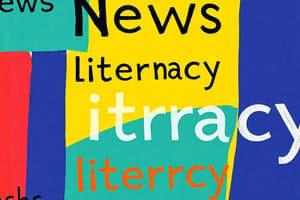Podcast
Questions and Answers
What is the Chinese word for 'big'?
What is the Chinese word for 'big'?
- 小
- 许多
- 所有
- 大 (correct)
Which of the following is the correct translation for 'milk'?
Which of the following is the correct translation for 'milk'?
- 果汁
- 茶
- 牛奶 (correct)
- 水
What day does 'April Fool's Day' refer to?
What day does 'April Fool's Day' refer to?
- 圣诞节
- 愚人节 (correct)
- 万圣节
- 劳动节
What is the meaning of 'VIP' in this context?
What is the meaning of 'VIP' in this context?
Which word refers to 'the universe'?
Which word refers to 'the universe'?
What does 'smile' translate to in Chinese?
What does 'smile' translate to in Chinese?
What is the Chinese term for 'supermarket'?
What is the Chinese term for 'supermarket'?
What is the meaning of 'mad' in this context?
What is the meaning of 'mad' in this context?
What is the Chinese translation for 'trash'?
What is the Chinese translation for 'trash'?
What does 'gosh' express in this context?
What does 'gosh' express in this context?
What is the correct translation of 'crazy' into Chinese?
What is the correct translation of 'crazy' into Chinese?
Which of the following words translates to '目标'?
Which of the following words translates to '目标'?
Which word is referenced as a holiday in this content?
Which word is referenced as a holiday in this content?
How is 'thank you' expressed in Chinese?
How is 'thank you' expressed in Chinese?
What is the Chinese term for 'milk'?
What is the Chinese term for 'milk'?
Which of the following is NOT a day of the week?
Which of the following is NOT a day of the week?
Flashcards are hidden until you start studying
Study Notes
Vocabulary
- English words with their Chinese translations are provided for effective bilingual learning.
- Common verbs and their meanings: "come" (来), "see" (看见), and "do" (做).
- Days of the week: Monday (星期一), Tuesday (星期二), Wednesday (星期三), Thursday (星期四), Friday (星期五), Saturday (星期六), Sunday (星期天).
- Important holidays: Christmas (圣诞节) and Halloween (万圣节).
Expressions
- Common phrases: "thank you" (谢谢你) and "happy new year" (新年快乐).
- Colloquial terms like "gosh" (天啊) and "mad" (生气) add an emotional context.
Nouns and Adjectives
- Important categories: nouns (名词) like "food" (食物), and adjectives (形容词) such as "big" (大), "small" (小), and colors like "red" (红色), "blue" (蓝色), "green" (绿色).
- Words related to celebrations like "April Fool's Day" (愚人节) and "Labor Day" (劳动节).
Activities and Objects
- Common activities: swimming (游泳), shopping (商店), and playing games (游戏).
- Everyday objects: computer (电脑), keyboard (键盘), and mouse (鼠标).
Places
- Types of stores: supermarket (超级市场), restaurant (餐厅), and market (市场).
- Modes of transportation: subway (地铁) and bike (自行车).
Emotions and Descriptions
- Emotional expressions: happy (高兴) and mad (生气); descriptors like cute (可爱) and delicious (好吃).
- Common verbs that express actions and states, providing versatile language utility.
Miscellaneous
- Terms related to labor, such as labor (劳动), union (工会), and strike (罢工).
- Concepts related to the universe: space (空间), galaxy (银河), and universe (宇宙) illustrate expansive and scientific ideas.
Vocabulary
- English words with their Chinese translations are provided for effective bilingual learning.
- Common verbs and their meanings: "come" (来), "see" (看见), and "do" (做).
- Days of the week: Monday (星期一), Tuesday (星期二), Wednesday (星期三), Thursday (星期四), Friday (星期五), Saturday (星期六), Sunday (星期天).
- Important holidays: Christmas (圣诞节) and Halloween (万圣节).
Expressions
- Common phrases: "thank you" (谢谢你) and "happy new year" (新年快乐).
- Colloquial terms like "gosh" (天啊) and "mad" (生气) add an emotional context.
Nouns and Adjectives
- Important categories: nouns (名词) like "food" (食物), and adjectives (形容词) such as "big" (大), "small" (小), and colors like "red" (红色), "blue" (蓝色), "green" (绿色).
- Words related to celebrations like "April Fool's Day" (愚人节) and "Labor Day" (劳动节).
Activities and Objects
- Common activities: swimming (游泳), shopping (商店), and playing games (游戏).
- Everyday objects: computer (电脑), keyboard (键盘), and mouse (鼠标).
Places
- Types of stores: supermarket (超级市场), restaurant (餐厅), and market (市场).
- Modes of transportation: subway (地铁) and bike (自行车).
Emotions and Descriptions
- Emotional expressions: happy (高兴) and mad (生气); descriptors like cute (可爱) and delicious (好吃).
- Common verbs that express actions and states, providing versatile language utility.
Miscellaneous
- Terms related to labor, such as labor (劳动), union (工会), and strike (罢工).
- Concepts related to the universe: space (空间), galaxy (银河), and universe (宇宙) illustrate expansive and scientific ideas.
Studying That Suits You
Use AI to generate personalized quizzes and flashcards to suit your learning preferences.




